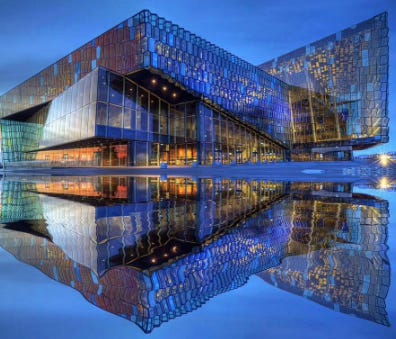Over the weekend, BBC Radio 3 was broadcasting from Reykjavik, Iceland, at the national concert hall that was still in darkness at 9 am since the sun wasn’t due to rise until after 11.
I’ve long been curious about this small Icelandic nation of 400,000 people, smaller than Edinburgh’s population of 514,990. After all, here in Scotland we’re continually told by our coloniser that we’re too small, poor and stupid to go it alone. That’s nonsense. Let’s look at Iceland more closely.
An active independence movement existed in Iceland throughout the 19th and early 20th century that resulted in the 1918 Danish–Icelandic Act of Union that declared Iceland a sovereign state but kept Iceland in a personal union with Denmark, meaning they shared a monarch. In 1944, a 2-part referendum was held where voters were asked 1) whether to abolish the personal union and 2) adopt a republican constitution. Both measures passed overwhelmingly, with 98% of voters turning out and 98% voting in favour.
Voting in Iceland takes place under a list PR system. The president, the head of state, is elected for a 4 year term with no term limits, and the Althing’s (parliament) 63 members serve 4 year terms. The judiciary is independent of the president and parliament.
Iceland’s economy is classified as high income and is dominated by tourism, fishing and aluminum smelting (electricity is cheap) and is one of the fastest growing economies in the OECD.

With such a small population, it relies on immigrants to alleviate labour constraints and since it’s a member of the European Economic Area (EEA), residents from other EEA nations, primarily Poland, come to Iceland for work. Iceland isn’t in the EU but is a member of the European Free Trade Association (EFTA), along with Switzerland, Norway and Lichtenstein. It’s a NATO member but has no armed forces of its own.
In the 1990s Iceland made a big mistake when it privatised and then deregulated its three banks (Landsbanki, Glitnir, and Kaupthing). They went on a global borrowing spree and when the 2008 western financial crisis hit, all 3 failed. Iceland was bailed out by the IMF with $2.1 billion and by its Scandinavian neighbours with $2.5 billion. It had incurred private debts four times the size of its GDP but simply walked away from them, enabling the country’s economy to recover fully by 2016. It helped that Iceland was outside the Eurozone. This meant it could devalue its currency, which it did by 50%. But that wasn’t all that needed to happen.
The political system needed cleaning up. The 2016 leak of the Panama Papers showed the extent to which Iceland’s political leaders and the bankers were entangled. Iceland had 600 names in the Panama Papers, including 3 cabinet ministers, the most per capita of any country. University of Iceland economics professor Thorvaldur Gylfason said:
The politicians and the bankers were in bed together — big time. Basically, it was under the weight of this corrupt arrangement that Iceland collapsed.
In 2009 the People took to the streets to protest the corruption. Iceland’s Supreme Court sent 39 bankers to prison and a constituent assembly was set up to draft a post-crash constitution for Iceland. An advisory referendum on the new constitution was held in 2012. 67% of the electorate declared their support for the bill and for key provisions such as national ownership of natural resources (83% said Yes). Despite this popular mandate, the new constitution still has not been implemented by parliament.
How is this relevant to Scotland? First, it demonstrates beyond any doubt that Scotland, with 12.5 times the number of people as Iceland, an advanced economy and far more natural resources, would be a hugely successful independent state.
Second, it demonstrates that having a system of governance that reflects the will of the People, not politicians, is vital. That system is Decentralised Direct Democracy, the only possible governance model for Scotland’s constitutional basis of Popular Sovereignty. It would mean the People would be firmly in charge of the politicians, armed with the political rights - referendums and popular initiatives - to hold government to account.
If Iceland had a system of direct democracy, the People could have launched a mandatory referendum on the new constitution and parliament would have no choice but to obey their will.
What’s dragging Scotland down is the UK and a Scottish political class that’s attached at the hip to Westminster and forced to operate within a feudal and undemocratic model that calls itself parliamentary democracy but is no more than crony capitalism. And, unlike Iceland, Scotland doesn’t control its economy, resources, trade, or foreign affairs. That’s all done very badly ‘on our behalf’ by the UK.
The UK is failing. It’s only a matter of time before it breaks apart. That’s why it’s so important for us to be thinking now about what kind of a nation we want to be. One where we are controlled by corporate/political interests or one where we are the ones in charge?
We can start the process by demanding that our MSPs implement the International Covenant on Civil and Political Rights before the end of this parliamentary session.
Please take a moment to sign the petition that was just posted on the Scottish Parliament’s website today and spread the word! Together, we can do this.







Shared on bluesky 👍